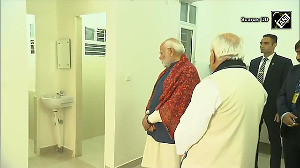.jpg?w=670&h=900) The Securities and Exchange Board of India will soon review the norms governing issue of employee stock ownership plan to provide India Inc more flexibility in rewarding staffers.
The Securities and Exchange Board of India will soon review the norms governing issue of employee stock ownership plan to provide India Inc more flexibility in rewarding staffers.
The regulator plans to again allow companies, specifically those with low promoter holding, to purchase shares from the secondary market for issuing esops.
The matter is likely to come up for consideration at Sebi’s board meeting on Thursday.
The move is aimed at helping those promoters that hold around 26 per cent stakes in their respective companies and run the risk of losing control if they issue stock options under the current guidelines.
Last year, Sebi had banned issue of esops through secondary-market purchase of shares and asked companies to, instead, issue fresh equity.
At present, there are nearly 100 companies with promoter holding between 26 per cent and 28 per cent. Promoters of these companies potentially face loss of control if they issue shares to employees.
“A lot of companies want to reward their shareholders by issuing esops. However, companies with promoter holding of around 26 per cent aren’t able to do so, as there are fears of loss of control.
"We will soon take steps to address this issue,” said a senior Sebi official.
Promoter holding of at least 26 per cent is significant from the new Companies Act perspective, which requires the assent of at least 75 per cent of shareholders for a special resolution to pass. If someone holds a 26 per cent stake, he can effectively block such resolutions.
Special resolutions can be used for making fundamental changes to the company, such as changing its Articles of Association or even winding-up operations.
Last January, Sebi’s notification barring employee welfare trusts from acquiring shares from the secondary market and directing existing schemes to realign with the new guidelines had created a lot of flutter among listed companies.
Daksha Baxi, executive director, Khaitan & Company, suggested the regulator could bring rules to limit purchases.
“If the esops were to be met through fresh issue of shares, it would lead to dilution of stake of all shareholders. . . The regulator could put in place checks and balances for permitting such acquisitions.
These could include setting an upper limit for shares that such trusts could acquire from the market, a requirement that the shares held by the trusts should be backed by an incentive scheme within a short period of time, say one or two years, etc,” she said.
Internationally, companies are allowed to issue esops through secondary-market purchases but Sebi had banned such a practice after it came to light that a lot of companies were using these to manipulate share prices.
Rajesh Srinivasan, partner, Deloitte Haskins & Sells, says allowing secondary-market purchases with appropriate checks and balances will be advantageous for both companies and their promoters.
“An esop transaction dilutes promoter stake if it happens through fresh issue of shares.
"A secondary-market transaction could help avoid that. Also, if an esop granted is through an actual cash transaction, it is easier from a the taxation perspective to deduct it as an expense.
"A fresh issue is considered a notional expense and has been challenged at times by the tax authorities,” he says.
“On the other hand, the cost could also be significant for companies, as operations in the secondary market result in cash outflows, as opposed to fresh issue where there is no cash transaction,” Srinivasan adds.
Some experts believe, the capital market regulator should entirely lift the ban on secondary-market purchases, rather than looking to create an elbow room through exceptions.
“If Sebi plans to allow secondary-market purchases, it should allow all companies.
"It shouldn’t bother about companies with low promoter holding.
If these companies wish to reward their employees, they can do so by giving monetary compensation or promoters can put in money to prevent dilution,” says Shriram Subramanian, managing director of Ingovern, a corporate governance advisory firm.
In November last year, in a discussion paper to completely review norms governing employee benefit schemes, Sebi had proposed allowing secondary-market purchases through the trust route.
The regulator is yet to take a final call on the consultation paper.
MORE OPTIONS
- Sebi might again allow secondary-market purchase of shares for issue of employee stock options
- Relaxation could be given to companies in which promoters have low holding and run the risk of losing control
- Sebi had last year banned open-market purchase for issue of esops and directed companies to issue fresh shares instead
- Esop-issuing companies with promoter holding of around 26% were hit by the new norm
- Relaxation likely at Sebi’s board meeting scheduled for Thursday
- Nearly 100 companies are likely to benefit from the relaxation












 © 2025 Rediff.com -
© 2025 Rediff.com -